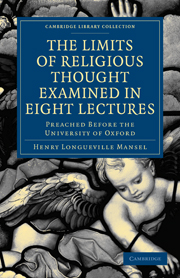 The Limits of Religious Thought Examined in Eight Lectures
The Limits of Religious Thought Examined in Eight Lectures Published online by Cambridge University Press: 29 August 2010
PRINCIPAL DOCTRINE MAINTAINED IN THESE LECTURES, IN ONE OF THE FOLLOWING FORMS:
That the Absolute Nature of God is unknown to man.
That conceptions derived from human consciousness do not represent the Absolute Nature of God.
That God is revealed in Scripture by means of relative conceptions, accommodated to man's faculties.
I. Clement of Alexandria.—Strom., ii. 16, p. 168, Sylb.: “The Divine Nature cannot be described as it really is. The Prophets have spoken to us, fettered as we are by the flesh, according to our ability to receive their saying, the Lord accommodating Himself to human weakness for our salvation” [Translated by Bishop Kaye, Clem. Alex., p. 141]. Strom, v. 12, p. 251. “The first principle of all things cannot be named. And if we give it a name, not properly (οủ κυρίως), calling it either One, or the Good, or Intellect, or the Very Existent, or Father, or God, or Maker, or Lord, we speak not as declaring its name, but by reason of our deficiency we employ good names, in order that the reason may be able to rest upon these, not wandering around others. For these names are not severally indicative of God, but all collectively exhibit the power of the Almighty: for the names of things are given to them either from the properties belonging to them, or from their relation to each other: but none of these can be received concerning God.”
To save this book to your Kindle, first ensure no-reply@cambridge.org is added to your Approved Personal Document E-mail List under your Personal Document Settings on the Manage Your Content and Devices page of your Amazon account. Then enter the ‘name’ part of your Kindle email address below. Find out more about saving to your Kindle.
Note you can select to save to either the @free.kindle.com or @kindle.com variations. ‘@free.kindle.com’ emails are free but can only be saved to your device when it is connected to wi-fi. ‘@kindle.com’ emails can be delivered even when you are not connected to wi-fi, but note that service fees apply.
Find out more about the Kindle Personal Document Service.
To save content items to your account, please confirm that you agree to abide by our usage policies. If this is the first time you use this feature, you will be asked to authorise Cambridge Core to connect with your account. Find out more about saving content to Dropbox.
To save content items to your account, please confirm that you agree to abide by our usage policies. If this is the first time you use this feature, you will be asked to authorise Cambridge Core to connect with your account. Find out more about saving content to Google Drive.